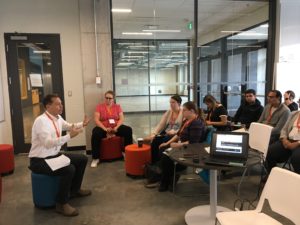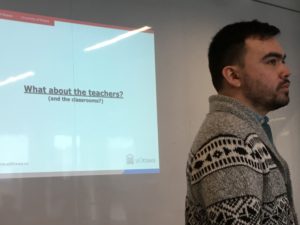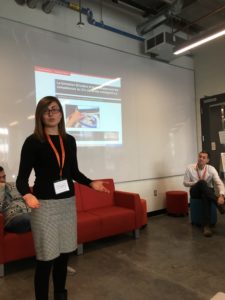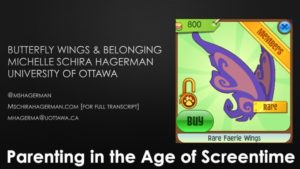To highlight their work and to promote the Maker spirit, the Makerspace team coordinates an annual symposium called the Ontario Makers, Mentors and Innovators (OMMIC) conference. This year, I was thrilled to have shared the spotlight with three brilliant graduate students conducting research on questions that sit at the intersections of teaching, Making and learning. Our presentation slides are embedded above.
Jean-Luc Ciocca presented a summary of his M.A. thesis research that explored how teachers plan for maker-oriented activities. His work offers new evidence of planning in action and the importance of teachers’ accepting the lack of control and very unpredictable nature of making as it unfolds.
Julie-Anne Turner presented an overview of her M.A.thesis project, which she designed and conducted with participants from the 2018 Canadian Institute for Digital Literacies Learning. In her preliminary analyses, she articulates features of maker-oriented professional learning for teachers and identifies important implications for practice — namely that for teachers to become Makers, it seems essential for them to learn through making. Access to theory and new ideas also seemed important for teachers’ learning. Plus, in Julie-Anne’s work, she noticed how much reflection and discussion took place during the Institute.
Jonathan Weber presented an overview of his PhD dissertation proposal that will explore the development of pre-service and in-service teachers’ Maker identities. The issue of Maker identity is fundamental to the realisation of any sort of broader vision for Making in K-12 schools. Jonathan’s work is in the early stages, but at the core of his project is an exploration of the complexities of teacher identities and the ways that what teachers believe about themselves shapes what they ultimately choose to do in classrooms.
Finally, I presented evidence from the first year of a SSHRC-funded research project focused on making as learning. In this work, we are beginning to understand the embodied nature of learning and the ways that children move to construct meanings with digital and physical tools.
We are so thankful to our Faculty of Engineering colleagues for creating the OMMIC conference, a space where Education research on Making can be shared with interdisciplinary audiences. We look forward to next year.




 With colleagues, I will be adding my perspectives on children and screentime to an important session at the NCTE Annual Convention in Houston, TX today.
With colleagues, I will be adding my perspectives on children and screentime to an important session at the NCTE Annual Convention in Houston, TX today.
From our proposal: “There are legitimate concerns about children’s physical, intellectual, and emotional well-being; yet conversations about screentime focus predominantly on the time spent on devices, often overlooking fundamentally important questions about what youth are learning by using technology. How do we navigate our own parenting lives when we are immersed in a field that values critical and creative use of devices, both in school and out, in order to build skills that are necessary for success in today’s world? What challenges do we as educators and parents face? How do we approach parenting in an age of screentime?
This session will bring together teachers and professors who are also parents to explore these questions and the notion of screentime itself. The opening keynote will situate the context by exploring the following questions. How is screentime portrayed in the media? Is all screentime created equal? What do we actually know from research? Then roundtable presenters will share challenges faced as parents.”
For my part, my Ignite-style talk (which, if you’ve never done one or seen one is 20 slides, timed to transition every 15 seconds) explores the challenges and opportunities that Virtual Playgrounds offer tweens going through tough transitions. Soon after we moved to Ottawa, my then 10-year old daughter started playing in a virtual world called Animal Jam. She loved it because her friends from school were playing, and as she told me in a conversation a couple of months ago, she felt successful there. At a time when everything was new, and she was always “the new girl” at school, she could be special in Animal Jam because she had “rare items” such as a coveted pair of butterfly wings. One afternoon, though, the wings were stolen by another player. Through her sobs, my daughter admitted she was tricked into giving out her account password by someone who had been her “friend” for some time in the game.
In the talk I offer five insights that align with and extend research on tweens’ virtual play in these kinds of virtual worlds. I also offer three big take-aways that could inform teaching and research.
Insights
- For tweens, virtual playgrounds are about making and strengthening friendships.
- Virtual worlds are an onramp to social media platforms and participation.
- In virtual playgrounds tweens can feel more successful, powerful, liked, important and altruistic than they feel at school.
- Getting scammed in a virtual playground can teach children important life lessons about trust.
- Kids need grounded, lived experiences, not lectures about “not giving out their passwords”. Kids don’t believe they’ll be scammed — but when they are scammed, they learn.
Implications for Teaching and Research
- Creating safe opportunities for kids to experience online scams could be an effective approach to teaching online interactions, safety and citizenship. Role play online scams and then talk about it with students.
- Open reflection over time with a loving adult, and without fear of judgment, seems important. My daughter was ashamed at first. She knew what she did. But reflection in the short and longer term has allowed her to articulate why she was tricked and learn from her mistake.
- For tweens going through tough transitions, online games can be important social onramps. But parents and teachers need to help kids find other ways to connect with friends and community in real (rather than virtual) life too.
Online and Offline Resilience?
Going through a difficult move, and then experiencing an online deception left my daughter feeling vulnerable. However, situating stress in opportunities for connection and conversation may enable tweens to become more resilient both online and offline. As a parent, this is my hope. As a researcher, this question warrants future study.
I have published all of this with her permission, but I ask that if you use this talk, or the transcript of our conversation for any reason (research, professional development sessions etc.) that you do not use images of my daughter, or of her art, without permission from me.
Thanks to Kristen Hawley Turner, Troy Hicks, Tom Liam Lynch, Bill Bass, Lindy Johnson, Sara Kajder, Lauren King, William Kist, Ian O’Byrne, Kristy Pytash, Michelle Walker, Angela Wiseman, Carl Young and Andrea Zellner for their work for this panel and for their collaborations on this session.
References
Kafai, Y.B. & Fields, D.A. (2013). Connected play: Tweens in a virtual world. Cambridge, MA: The MIT Press.
]]>